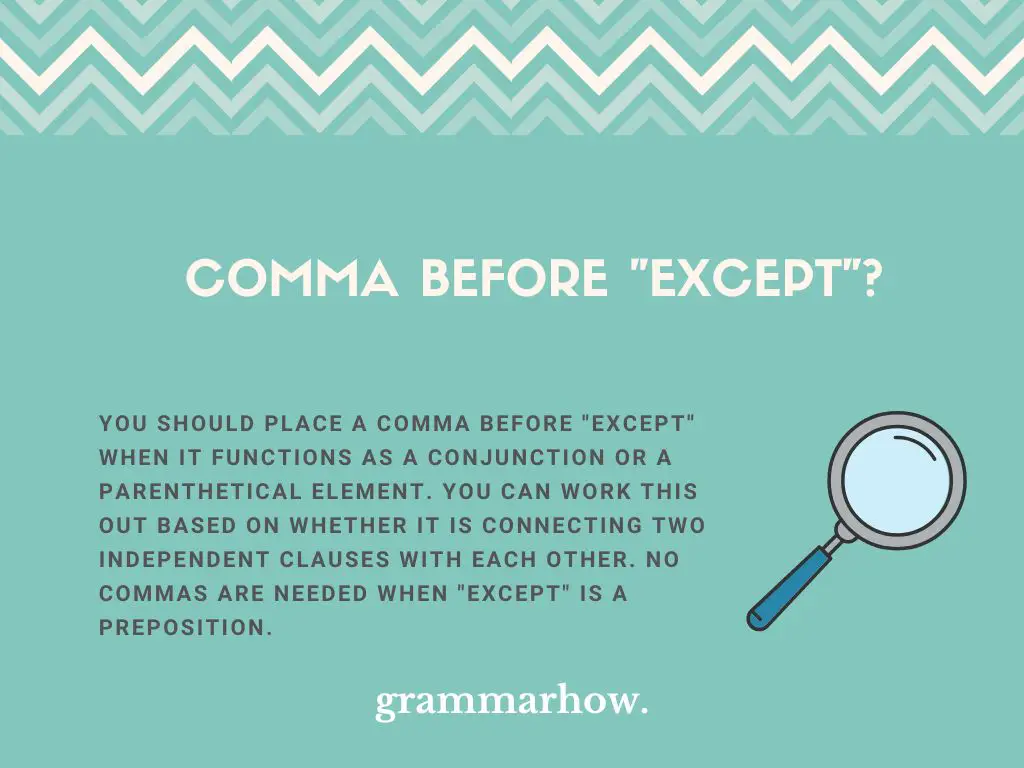Commas are much more important than you might first realize. They’re not something you should chuck in everywhere, but they certainly have their place in your writing. This article will look at placing commas before “except” and how you can get it right every time.
Comma Before “Except”?
You should place a comma before “except” when it functions as a conjunction or a parenthetical element. You can work this out based on whether it is connecting two independent clauses with each other. No commas are needed when “except” is a preposition.

You will be able to use “except” as a conjunction when it connects two clauses:
- I did not do the tasks, except maybe the ones that he expected of me.
It can also have a comma before it when it’s part of a parenthetical element:
- Every day, except Thursday, this week was a difficult one.
However, when it’s a preposition, it’s not supposed to come with any commas:
- I did it all except for that because I didn’t expect it to help.
When to Use a Comma Before “Except”
You should place a comma before “except” when it works as a conjunction or a parenthetical element. As a conjunction, it is used to connect two independent clauses with each other. As a parenthetical element, it is added as further information to a sentence.
“Except” as a Conjunction
- I was going to get around to it eventually, except I didn’t fancy doing any of it.
- He really wanted to do something about it, except he didn’t know what he could have brought to the table to help.
- She told me a lot about this, except she didn’t believe that it was going to be something that was worth her time.
- We have a lot to discuss, except we don’t want you to know much about what’s going on around here. Sorry about that.
- They didn’t need to know that, except maybe the ones that asked about it. Why would you be so reckless with that information?
As a conjunction, “except” connects two independent clauses. Generally, if you remove “except” from the sentence, you would be left with two clauses that can work as independent sentences from each other.
“Except” as a Parenthetical Element
- All of my family, except Marcus, were there to see me off. I felt a bit betrayed that he wasn’t around.
- I’ve worked every day this week, except Friday, because my boss has ordered me to pick up his slack.
- You will find they all agree, except Antony, because they know what’s good for them.
- I like most fruit, except oranges, so I’m more than happy to snack on most of these things.
- I will eat anything, except maybe ice cream, since I have quite an impressive appetite.
As a parenthetical element, “except” introduces a dependent clause that can add further information to the sentence. It could be removed from the sentence, and the meaning would still be there.
When to Use “Except” Without a Comma
You do not need to put a comma before “except” when it is used as a preposition. Prepositions are never punctuated in English. They are only used as a way to bridge gaps between certain connections. It’s best to avoid using commas entirely in this case.
- Except for most of the things listed here, I don’t see a reason why he wouldn’t come.
- I wanted to be there except for the simple fact that it looked really boring.
- I needed to go except for the cake that was being handed out. I really wanted to stick around for it.
- The entire family attended except Julia. I don’t know why she didn’t want to come along to say goodbye.
- I was already made aware of this fact. Except for Michael, everybody else has a duty to attend to.
As you can see, no commas are needed when “except” is used in this format.
Final Thoughts
“Except” should have a comma before it as a conjunction or a parenthetical element. If it adds further information to the sentence or allows you to connect two independent clauses, the comma should be there. If it’s only a preposition, there is no reason to place a comma beforehand.

Martin holds a Master’s degree in Finance and International Business. He has six years of experience in professional communication with clients, executives, and colleagues. Furthermore, he has teaching experience from Aarhus University. Martin has been featured as an expert in communication and teaching on Forbes and Shopify. Read more about Martin here.
